Yuhwan Jeong
Robust Adverse Weather Removal via Spectral-based Spatial Grouping
Jul 30, 2025Abstract:Adverse weather conditions cause diverse and complex degradation patterns, driving the development of All-in-One (AiO) models. However, recent AiO solutions still struggle to capture diverse degradations, since global filtering methods like direct operations on the frequency domain fail to handle highly variable and localized distortions. To address these issue, we propose Spectral-based Spatial Grouping Transformer (SSGformer), a novel approach that leverages spectral decomposition and group-wise attention for multi-weather image restoration. SSGformer decomposes images into high-frequency edge features using conventional edge detection and low-frequency information via Singular Value Decomposition. We utilize multi-head linear attention to effectively model the relationship between these features. The fused features are integrated with the input to generate a grouping-mask that clusters regions based on the spatial similarity and image texture. To fully leverage this mask, we introduce a group-wise attention mechanism, enabling robust adverse weather removal and ensuring consistent performance across diverse weather conditions. We also propose a Spatial Grouping Transformer Block that uses both channel attention and spatial attention, effectively balancing feature-wise relationships and spatial dependencies. Extensive experiments show the superiority of our approach, validating its effectiveness in handling the varied and intricate adverse weather degradations.
Towards Real-world Event-guided Low-light Video Enhancement and Deblurring
Aug 27, 2024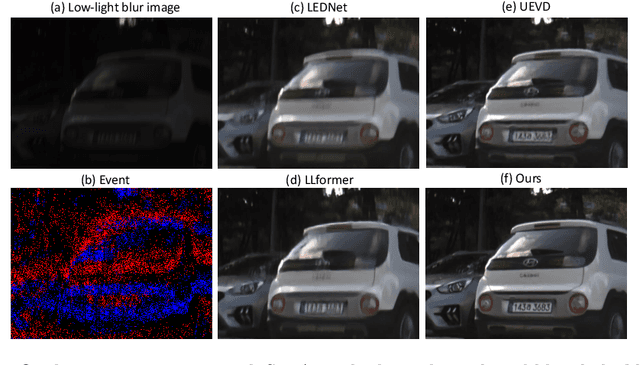

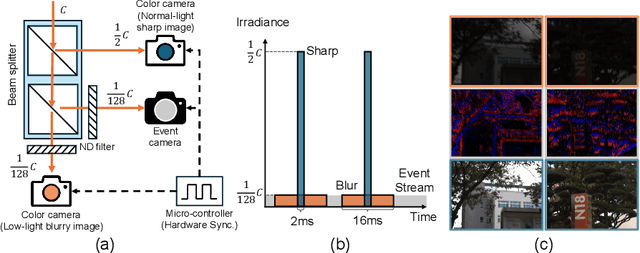
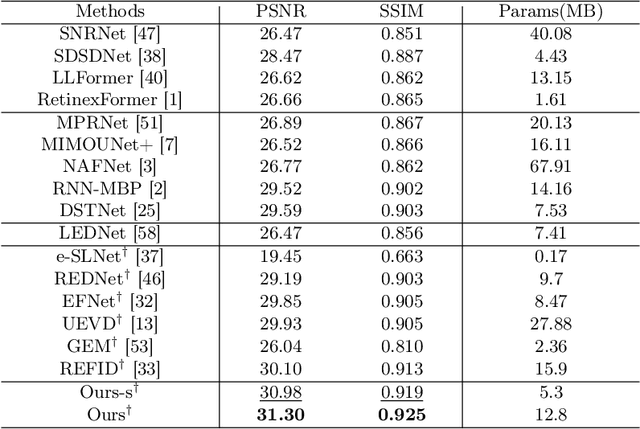
Abstract:In low-light conditions, capturing videos with frame-based cameras often requires long exposure times, resulting in motion blur and reduced visibility. While frame-based motion deblurring and low-light enhancement have been studied, they still pose significant challenges. Event cameras have emerged as a promising solution for improving image quality in low-light environments and addressing motion blur. They provide two key advantages: capturing scene details well even in low light due to their high dynamic range, and effectively capturing motion information during long exposures due to their high temporal resolution. Despite efforts to tackle low-light enhancement and motion deblurring using event cameras separately, previous work has not addressed both simultaneously. To explore the joint task, we first establish real-world datasets for event-guided low-light enhancement and deblurring using a hybrid camera system based on beam splitters. Subsequently, we introduce an end-to-end framework to effectively handle these tasks. Our framework incorporates a module to efficiently leverage temporal information from events and frames. Furthermore, we propose a module to utilize cross-modal feature information to employ a low-pass filter for noise suppression while enhancing the main structural information. Our proposed method significantly outperforms existing approaches in addressing the joint task. Our project pages are available at https://github.com/intelpro/ELEDNet.
Towards Robust Event-based Networks for Nighttime via Unpaired Day-to-Night Event Translation
Jul 15, 2024
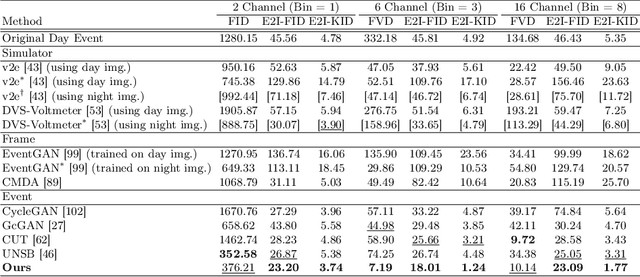
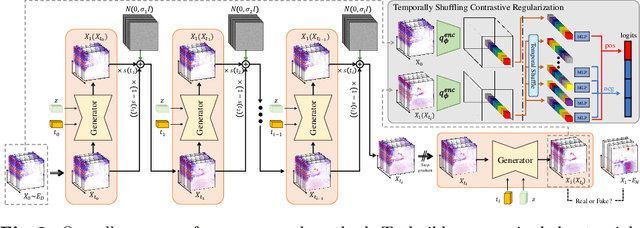
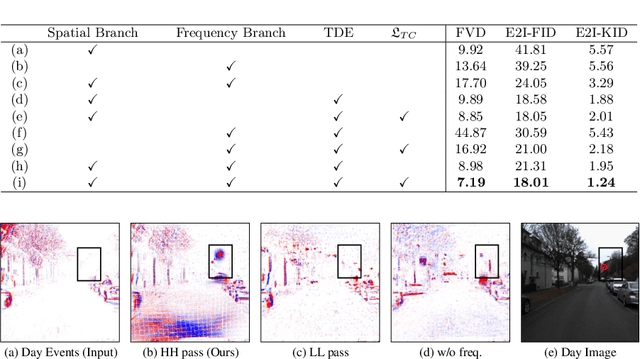
Abstract:Event cameras with high dynamic range ensure scene capture even in low-light conditions. However, night events exhibit patterns different from those captured during the day. This difference causes performance degradation when applying night events to a model trained solely on day events. This limitation persists due to a lack of annotated night events. To overcome the limitation, we aim to alleviate data imbalance by translating annotated day data into night events. However, generating events from different modalities challenges reproducing their unique properties. Accordingly, we propose an unpaired event-to-event day-to-night translation model that effectively learns to map from one domain to another using Diffusion GAN. The proposed translation model analyzes events in spatio-temporal dimension with wavelet decomposition and disentangled convolution layers. We also propose a new temporal contrastive learning with a novel shuffling and sampling strategy to regularize temporal continuity. To validate the efficacy of the proposed methodology, we redesign metrics for evaluating events translated in an unpaired setting, aligning them with the event modality for the first time. Our framework shows the successful day-to-night event translation while preserving the characteristics of events. In addition, through our translation method, we facilitate event-based modes to learn about night events by translating annotated day events into night events. Our approach effectively mitigates the performance degradation of applying real night events to downstream tasks. The code is available at https://github.com/jeongyh98/UDNET.
 Add to Chrome
Add to Chrome Add to Firefox
Add to Firefox Add to Edge
Add to Edge